April 14, 2025 | 10:37 GMT +7
April 14, 2025 | 10:37 GMT +7
Hotline: 0913.378.918
April 14, 2025 | 10:37 GMT +7
Hotline: 0913.378.918
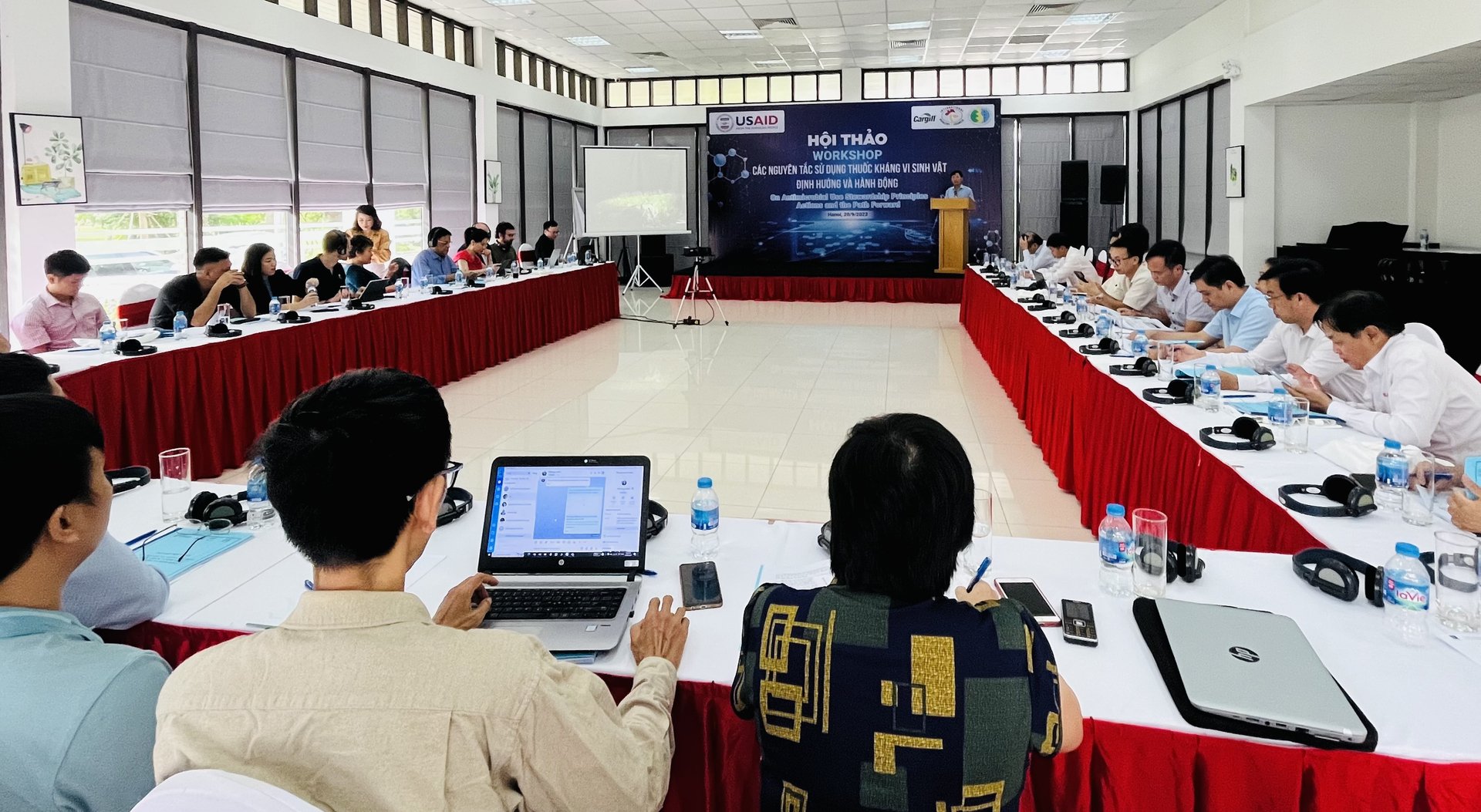
The Workshop on "Antimicrobial Use Stewardship Principles: Actions and the Path Forward" was organized on the morning of September 20 in Hanoi, attracting a considerable number of participants. Photo: Hong Tham.
According to Mr. Nguyen Thanh Son, Chairman of VIPA, the misuse of antibiotics in livestock production leads to the rise in antibiotic resistance, which is currently threatening global health and development.
The World Health Organization (OIE) has issued a warning that over 700,000 people around the world die from antibiotic-resistant bacteria every year. If the current rate of antibiotic resistance continues, the number of deaths caused by antibiotic-resistant bacteria could reach 10 million people by 2050.
According to Mr. Son, a 2015 survey on the use of antibiotics in pig farming in five provinces of Dong Nai, Ba Ria - Vung Tau, Binh Duong, Thai Binh, and Nam Dinh conducted by the Department of Animal Health, revealed that up to 100% of livestock production facilities relied on antibiotics for disease prevention and treatment in pigs.
Additionally, 68% of these facilities used antibiotic-containing animal feed for disease prevention and growth promotion; 24% of the facilities mixed antibiotics into animal feed for disease prevention and growth promotion, with 1.23% of households using raw antibiotics in the mixture.
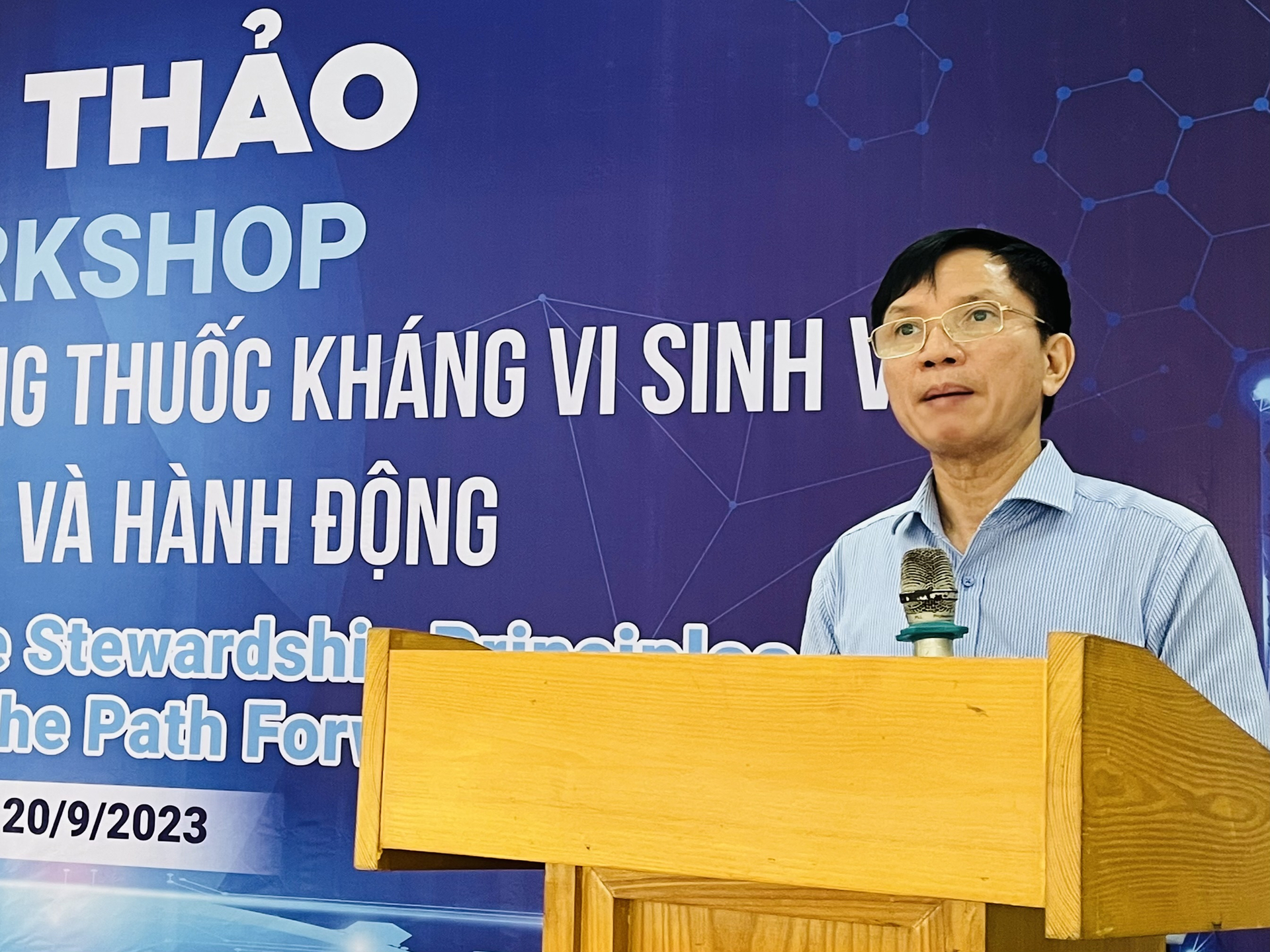
According to Mr. Nguyen Thanh Son, Chairman of VIPA, the misuse of antibiotics in livestock production leads to the rise in antibiotic resistance, which is currently threatening global health and development. Photo: Hong Tham.
Mr. Son added that according to the Department of Animal Health, despite the widespread reliance on antibiotics in livestock production facilities, only 63% of the facilities adhere to the correct dosage and treatment regimen for antibiotic use. Most notably, Southeastern provinces have a higher antibiotic usage rate in livestock production compared to Northern provinces.
According to Mr. Bui Van Minh Bao, Technical Director of Tafa Viet Company, stressed that the discovery and application of antibiotics in livestock treatment represent a significant historical milestone for humanity.
The use of antibiotics in livestock production is increasingly popular due to a variety of factors, including treating animal diseases to ensure survival, controlling disease spread within herds, preventing common diseases from the outset, reducing treatment costs, improving animal growth, and enhancing nutrient utilization efficiency.
"The growing scale of industrial livestock production, high population density, and significant environmental pressures have forced the majority of livestock farmers to rely on antibiotics. Vietnam imports over 1,000 tons of antibiotics for pig farming and 50 tons of antibiotics for poultry farming every year. Additionally, nearly 80% of livestock farmers use antibiotics spontaneously without following treatment protocols, leading to antibiotic resistance and health risks to users," added Mr. Bao.

Mr. Bui Van Minh Bao, Technical Director of Tafa Viet Company, emphasized the importance of finding solutions to minimize antibiotic use for the efficient and sustainable development of Vietnam's agriculture sector as a whole, with an emphasis on livestock production.
Mr. Dao Tuan Hung, owner of a poultry farm in Thai Binh province, raised his concerns, "My farm currently raises 48,000 laying hens. The principle is to minimize or prevent antibiotic use, however we find it hard to follow in practice. How can we reduce antibiotic usage rate, increase productivity, and ensure product quality to provide clean and high-quality products to consumers? This is a concern for many producers such as myself."
According to Mr. Bui Van Minh Bao, the average animal health costs in Vietnam account for 5 to 7% of the product cost, which can rise to 10 to 12% during disease outbreaks. On the other hand, developed countries such as the Netherlands have effectively utilized technology and biological safety to reduce these costs to as low as 0.5%.
Mr. Bao stated that Tafa Viet Company is currently implementing a production process aimed at enhancing natural resistance which consists of eight steps: biological safety, breeding, nutrition, water source, developing microclimate in the barn, vaccination and post-vaccination monitoring, data digitization, and capacity buulding.
"It is essential to find solutions to minimize antibiotic use in order to promote the efficient and sustainable development of Vietnam's agriculture sector as a whole, with an emphasis on livestock production. Accordingly, livestock farmers need to focus on improving the quality of breeds, providing balanced nutritional formulas that are both economically efficient and environmentally friendly, and importing bacterial vaccines and biological products as alternatives to antibiotics," proposed Mr. Bao.
Mr. Pham Huu Quang from CP Vietnam Corporation emphasized the need to understand the fundamental causes to reduce antibiotic use in livestock production. CP Vietnam Corporation has identified two key reasons for antibiotic use which include diseases and poor management and care. Consequently, they can lead to to reduced animal immunity, further encouraging the use of antibiotic for treatment.
Mr. Quang also shared CP Vietnam's experience in minimizing antibiotic use with measures such as producing high-quality breeding stock, raising poultry in closed farms with automatic control systems to maintain suitable temperature, air circulation, and living conditions for each growth stage. These factors help create the best environment for poultry feeding and development.
The company also utilizes automatic feeding and drinking systems to ensure clean and adequate food and water for poultry, minimize human intervention inside the barn during the rearing period, implement vaccination programs for active immunity, and use probiotics as alternatives to antibiotics.
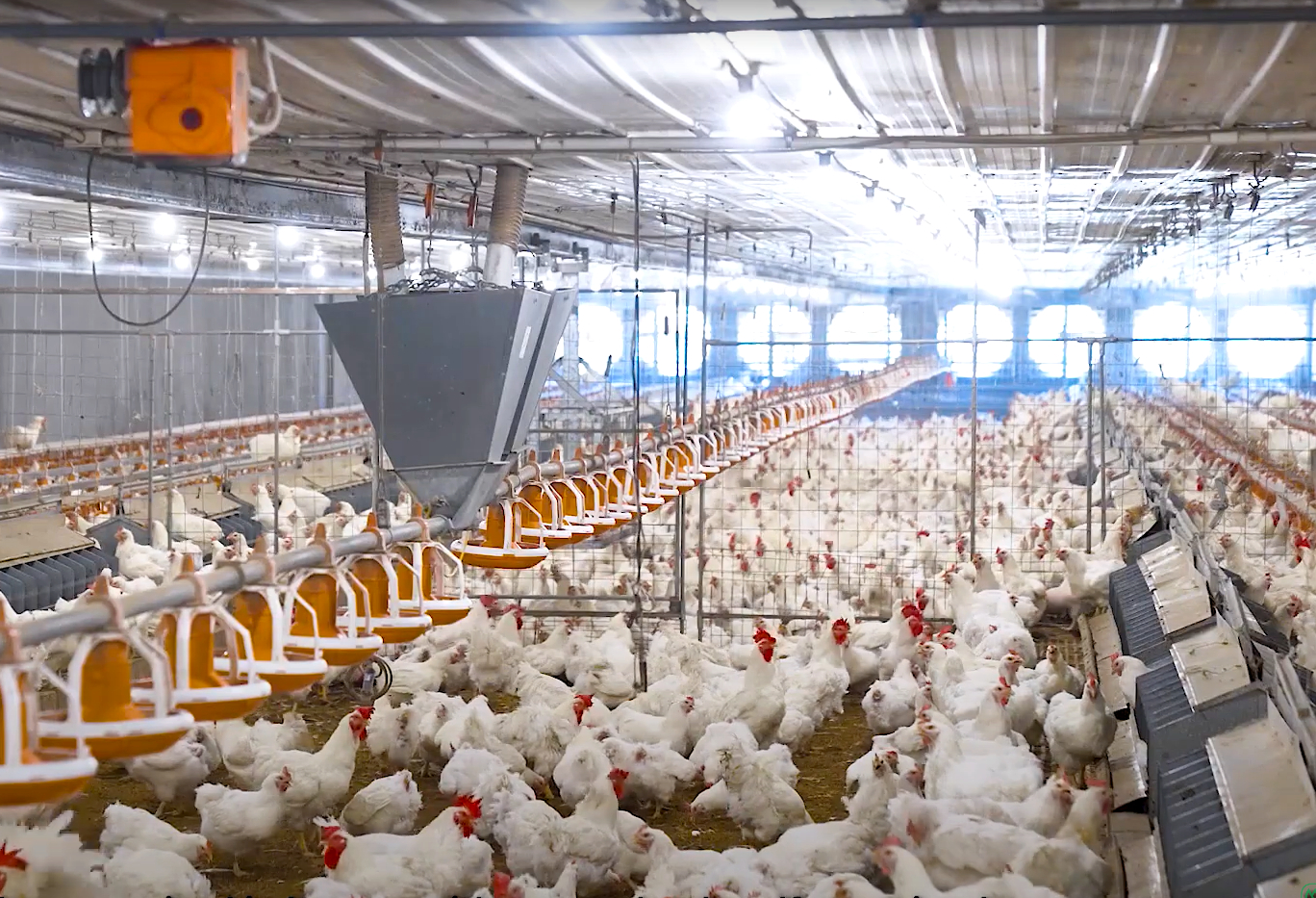
Minimizing antibiotic usage and moving towards antibiotic-free practices in livestock production is a challenging endeavour. Photo: Hong Tham.
Ms. Le Thi Hue, Deputy Head of Drug Management under the Department of Animal Health, Ministry of Agriculture and Rural Development, stated that the National Action Plan for combating antibiotic resistance has been issued by the Ministry. It consists of two phases: the first phase from 2017 to 2020 focusing on livestock and aquacultural production, and the second phase from 2021 to 2025 focusing on the agricultural sector as a whole.
The Ministry of Agriculture and Rural Development has also issued Circular No. 12/2020/TT-BNNPTNT, which regulates the management of veterinary drugs containing narcotics, precursors; veterinary prescription writing, and amendments to certain provisions under Circular No. 18/2018/TT-BNNPTNT. These documents serve to ensure the appropriate usage and correct dosage of antibiotics in order to prevent antibiotic resistance in livestock and aquacultural production.
"We hope that pharmaceutical producers and poultry farms will implement the state regulations in practice, with the goal of producing clean and safe poultry products that protect consumer health," added Ms. Hue.
Nguyen Thanh Son, Chairman of VIPA, emphasized that minimizing antibiotic usage and moving towards antibiotic-free practices in livestock production is a significant challenge. Despite its difficulty, it is essential for the well-being of every Vietnamese family to use high-quality and safe animal products.
Dennis Erpeiding from the International Poultry Council (IPC) stated, "Poultry meat has become the most favored choice of meat around the world. The poultry industry in Vietnam is expected to grow significantly and play a crucial role in the future. Minimizing antibiotic usage and moving towards antibiotic-free practices in livestock production is a necessity. To this extent, we need to focus on biosecurity, hygiene, poultry care measures, nutrition, and disease prevention strategies. Moreover, we must identify potential diseases at each of the growth stages and promptly implement appropriate preventive measures."
The Workshop on "Antimicrobial Use Stewardship Principles: Actions and the Path Forward" was organized in Thach That district, Hanoi, on September 20 by the Vietnam Poultry Association in collaboration with Cargill and the International Poultry Council. This workshop is part of the Transformative Farming Risk Reduction (TRANSFORM) project implemented by Cargill and IPC.
Translated by Nguyen Hai Long
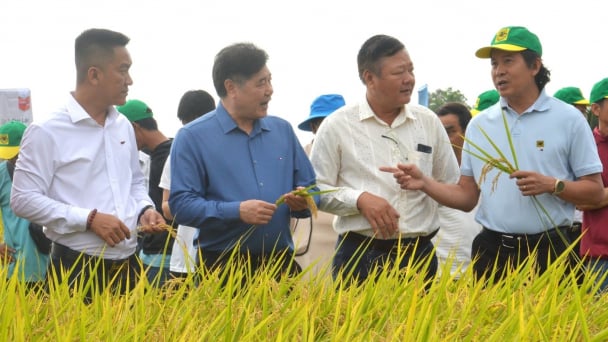
(VAN) The results from pilot fields are catalyzing the expansion of the One million hectares of high-quality, low-emission rice project in Kien Giang.
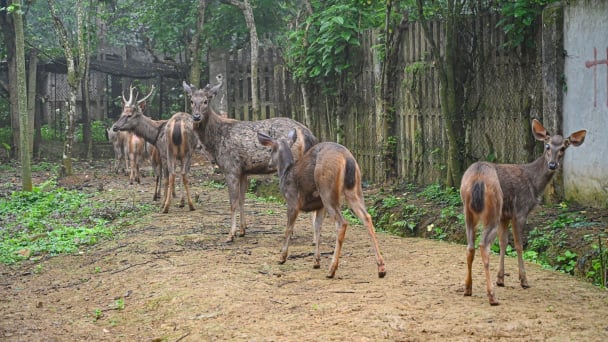
(VAN) On the morning of April 11, Cuc Phuong National Park received 18 individuals of endangered and rare wild animals from Da Nang city.
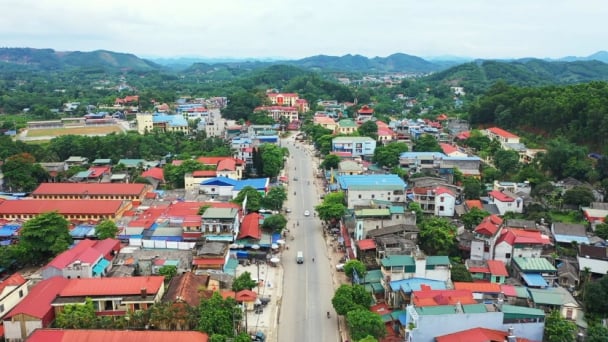
(VAN) FAO supports Vietnam in enhancing survey sampling techniques for the 2025 nationwide agricultural and rural census.

(VAN) By participating in the green transition, manufacturers become an indispensable part of the circular economy, contributing to resource optimization and environmental protection.
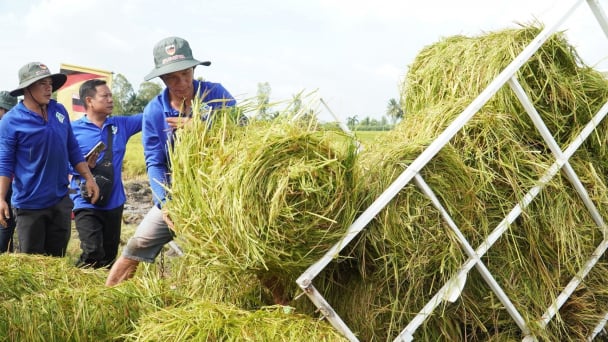
(VAN) The One Million Hectares of High-Quality and Low-Emission Rice Program can generate nearly 14 million tons of straw annually, posing an urgent requirement to diversify straw-based products.
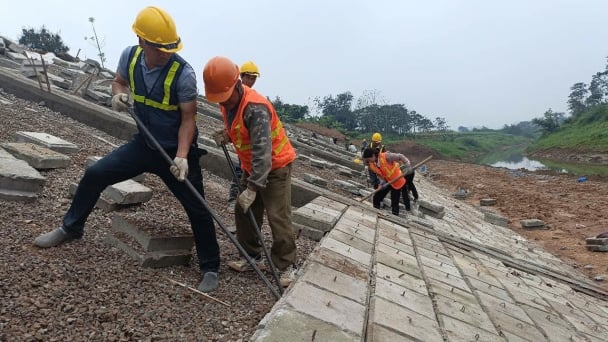
(VAN) This figure was recently announced at a conference held in Yen Bai, focusing on climate-resilient infrastructure development for ethnic minority regions.
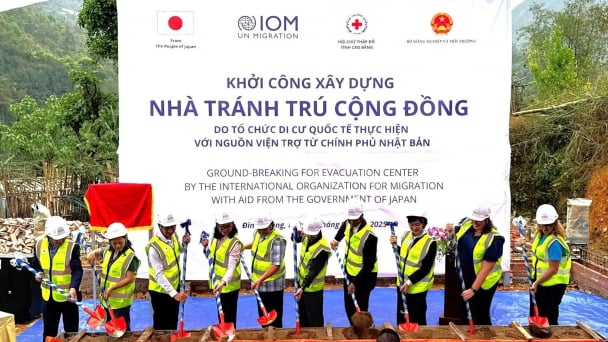
(VAN) The evacuation center is a practical work in efforts to respond to natural disasters and adapt to climate change in vulnerable areas.